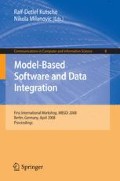Abstract
Situational applications require business users to create combine, and catalog data feeds and other enterprise data sources. Damia is a lightweight enterprise data integration engine inspired by the Web 2.0 mashup phenomenon. It consists of (1) a browser-based user-interface that allows for the specification of data mashups as data flow graphs using a set of Damia operators specified by programming-by-example principles, (2) a server with an execution engine, as well as (3) APIs for searching, debugging, executing and managing mashups. Damia provides a base data model and primitive operators based on the XQuery Infoset. A feed abstraction built on that model enables combining, filtering and transforming data feeds. This paper presents an overview of the Damia system as well as a research vision for data-intensive situational applications. A first version of Damia realizing some of the concepts described in this paper is available as a webserivce [17] and for download as part of IBM’s Mashup Starter Kit [18].
Access this chapter
Tax calculation will be finalised at checkout
Purchases are for personal use only
Preview
Unable to display preview. Download preview PDF.
References
Jhingran, A.: Enterprise Information Mashups: Integrating Information, Simply. In: VLDB 2006, pp. 3–4 (2006)
Clearforest Inc. http://www.clearforest.com/
DB2 pureXMLTM technology, http://www-306.ibm.com/software/data/db2/xml/
Dojo, the Javascript toolkit, http://dojotoolkit.org/
Kapow Technologies, http://www.kapowtech.com/
Lixto Software Gmbh, http://www.lixto.com/
PEAR - PHP Extension and Application Repository, http://pear.php.net/
PHP: Hypertext Preprocessor, http://www.php.net/
Programmable Web, http://www.programmableweb.com/
Strikeiron Inc., http://www.strikeiron.com/
Unstructured Information Management Architecture (UIMA), IBM Research, www.research.ibm.com/UIMA/
Yahoo Pipes, http://pipes.yahoo.com/pipes/
Ennals, R., Garofalakis, M.N.: MashMaker: mashups for the masses. In: SIGMOD Conference 2007, pp. 1116–1118 (2007)
Tatemura, J., Sawires, A., Po, O., Chen, S., Candan, K.S., Agrawal, D., Goveas, M.: Mashup Feeds: continuous queries over web services. In: SIGMOD Conference 2007, pp. 1128–1130 (2007)
Maximilien, M.: Web Services on Rails: Using Ruby and Rails for Web Services Development and Mashups. IEEE SCC (2006)
Wong, J., Hong, J.I.: Making mashups with marmite: towards end-user programming for the web. In: CHI 2007, pp. 1435–1444 (2007)
IBM Damia Service on IBM Alphaservices, http://services.alphaworks.ibm.com/damia
IBM Mashup Starter Kit on IBM Alphaworks, http://www.alphaworks.ibm.com/tech/ibmmsk
Author information
Authors and Affiliations
Editor information
Rights and permissions
Copyright information
© 2008 Springer-Verlag Berlin Heidelberg
About this paper
Cite this paper
Markl, V., Altinel, M., Simmen, D., Singh, A. (2008). Data Mashups for Situational Applications. In: Kutsche, RD., Milanovic, N. (eds) Model-Based Software and Data Integration. MBSDI 2008. Communications in Computer and Information Science, vol 8. Springer, Berlin, Heidelberg. https://doi.org/10.1007/978-3-540-78999-4_3
Download citation
DOI: https://doi.org/10.1007/978-3-540-78999-4_3
Publisher Name: Springer, Berlin, Heidelberg
Print ISBN: 978-3-540-78998-7
Online ISBN: 978-3-540-78999-4
eBook Packages: Computer ScienceComputer Science (R0)

